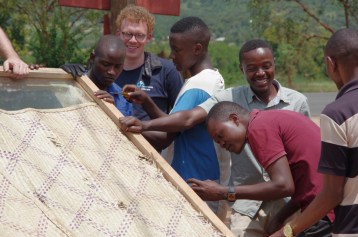
Hello, I am Edgar Dingeldein, 58 years old, married and with two children. I live south of Darmstadt in an area called Modautal.

I am an architect and right now I am head of the Department of Construction Management and Technical Operations of the Technical University of Darmstadt. After secondary school I started a two-year formation as a carpenter and cabinetmaker and worked afterwards in a workshop for people with disabilities as well as a carpentry. 1985-1992 I studied architecture at the Technical University of Darmstadt. Immediately after graduating as architect I found an architect`s office with three other graduates and was co-owner just until 2008, when I decided to look for new challenges elsewhere. My destiny brought me back to my roots and so I ended up again at the Technical University of Darmstadt.
In the several journeys throughout Africa, where I ended up in Morocco, the Sahara, through the Atlas Mountains as well as to Kenia, the topic of clean drinking water always was an omnipresent companion. In rural areas more than in cities, but nonetheless even in cities it is not possible to drink tap water without boiling it first. The consequences of drinking water that is biologically or chemically contaminated can be devastating. Kids that are unable to attend to school or parents to work, but also chronic illnesses or a lower life expectancy. Personal, familial or social developments are directly dependent on the availability of drinking water. I asked myself if I could contribute in any way to the improvement this situation and that is how I ended up joining the local group of Engineers Without Borders (EWB) in Darmstadt. Here I am an active SoWaDi member since November 2018. I like to be part of actual projects and to bring in my experience. EWB is not only well prepared in the technical area and the content, but also works very reflected on the topic of development cooperation. The work is interdisciplinary, everyone is able and welcome to join and that is a concept I really like. Within SoWaDi I work in the subgroup performance where I can contribute technical expertise in the fields of construction, design, materials and woodworking. Furthermore, for our mission here in Tanzania I took over the job as photographer.
Before leaving we had numerous obstacles to overcome. The three subgroups performance, manual and 3D-modeling could work together even more effectively and optimize the interfaces, thus enabling the concept to be worked out even better.
Another challenge for all of us is the semester-related fluctuations in student numbers, and personally my job at TU Darmstadt is also very demanding. The fluctuation among students requires a great deal of effort to ensure that knowledge is maintained and transferred. The changes that my involvement with Engineers Without Borders brought about, were most noticeable in relation to my free time, which I invested largely in project work. Especially the preparation for the departure was very time-consuming. Although this was to be expected, it was still more than anticipated. At the same time, I received an incredible amount of positive feedback and interest from my personal environment. The development cooperation and the SoWaDi project are new for me and led to a completely different way of approach to the younger generation, since the group consists mainly of students.

What important things happened in this last week? First of all, our Tanzanian partners, together with Julius, Jonas and I have repaired both devices and mastered some challenges such as material purchase. We were under some pressure and often had to improvise. With team spirit and commitment, we nevertheless succeeded in getting both devices up and running on Friday as planned. Unfortunately, we were not able to make a fresh tea with SoWaDi water because the sun did not play along. Finally, a last meeting with the users on site was held to discuss the further procedure and to establish a communication channel for close cooperation. In the meantime, we returned from Mwanga to Moshi and discussed the implementation of the project at the next location. Retrospectively, what impressed me most at our first stopover was the wonderful hospitality of Gasianus and his wife as well as his commitment to the Vocational Training Center and the students.

From now on, however, it is time to prepare for the next location: Kidia Primary School. The general conditions there are still largely unknown, and it will certainly be exciting to arrive there and deal with the situation. Our plan is to first discuss the situation with all those involved, to emphasize the importance of an intact water supply together in workshops and to go shopping. All in all, I hope to gain more knowledge of the SoWaDi device from this journey on the one hand. On the other hand, I am curious to find out how what we have been planning for so long will look like and work when implemented. Personally, I think regular changes of perspective are important and I want to broaden my horizon. I want to see new facets of the world with my own eyes, because usually media only show the world in a filtered way. SoWaDi is a genius idea, but there are still question marks regarding the benefits and costs of the system. Despite these uncertainties, I hope that the project will find broad acceptance.



